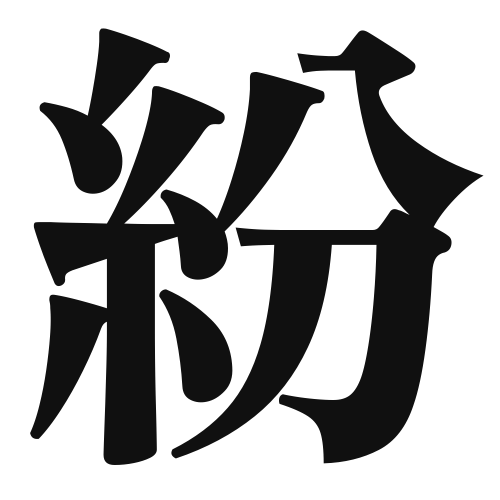1. Overview of Meaning
The kanji “紛” (fun) generally means “to confuse,” “to mix,” or “to be in disorder.” It conveys a sense of chaos or a lack of clarity in a situation.
2. Formation and Radical
Formation of the Kanji: The kanji “紛” is a phonetic-ideographic character (形声文字). It combines the radical for “silk” (糸) on the left, which relates to textiles, and the phonetic component “分” (bun), which means “to divide” or “to separate.” This combination suggests the idea of threads being mixed or tangled.
Radical: The radical of “紛” is 糸 (ito), which is associated with silk and textiles.
3. Examples of Usage
Common Words and Phrases:
- 紛失 (funshitsu) – loss, misplacement
- 紛争 (funso) – dispute, conflict
Example Sentences in Daily Conversation:
- 彼は書類を紛失してしまった。
(Kare wa shorui o funshitsu shite shimatta.)
(He has lost the documents.) - この問題は紛争を引き起こす可能性がある。
(Kono mondai wa funso o hikiokosu kanousei ga aru.)
(This issue has the potential to cause a dispute.)
4. Synonyms and Antonyms
Similar Kanji:
- 混 (kon) – to mix; it emphasizes the act of mixing rather than the confusion that “紛” implies.
Antonyms:
- 整 (sei) – to arrange; it conveys the idea of order and organization, which is the opposite of confusion.
5. Cultural and Historical Background
Relation to Japanese Culture: The concept of “紛” is often associated with the complexities of human relationships and societal issues, reflecting the challenges of maintaining harmony.
Proverbs and Idioms:
- 「紛れもない事実」 (magire mo nai jijitsu) – an undeniable fact; this phrase emphasizes clarity amidst confusion.
